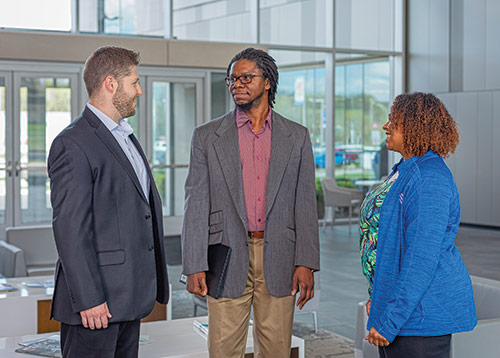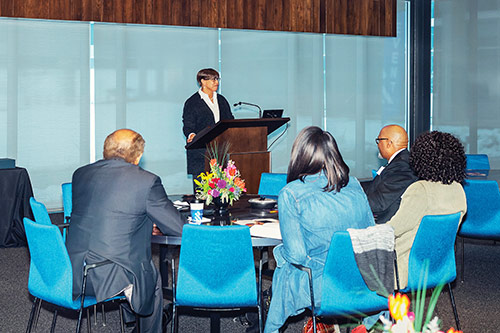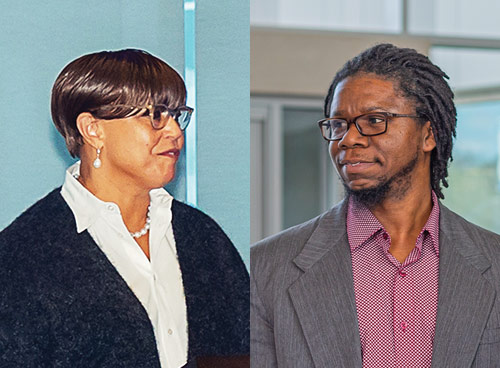Workplace Diversity
Laron Evans is Diverse Business Manager at Burns & McDonnell.
Michelle Word is Business Diversity Director at Burns & McDonnell.


PUF's Steve Mitnick: What are you up to these days in the areas of utility spend and workplace diversity?
Laron Evans: In our T&D Group, we are making certain that we give more and appropriate attention to include diverse businesses on our projects. That involves working closely with our client account managers, project managers and/or anyone who has control over project activities so that every project has a subcontractor plan that includes a sufficient pool of diverse suppliers.
PUF:Burns & McDonnell is a big contractor, but often you have a bunch of smaller subcontractors, so you have to work to make sure that you've got good balance, right?
Michelle Word: We understand the importance and significance of building and maintaining business relationships with teaming partners. However, we do not want any supplier to believe they are guaranteed work. The United States Small Business Administration encourages prime contractors to rotate suppliers, so that other businesses have an opportunity to compete for work. We agree and comply with those standards.
PUF:Why is this good, and why is it good to have diversity?
Michelle Word: It promotes equity. If a prime is truly interested in procuring the best value, they will include diverse businesses in their competitive bidding process. Why would we omit any segment of the population that can provide the expertise our projects need? How many innovations have been suppressed because of opportunities that were withheld from deserving diverse business owners?
Laron Evans: Diversity is good because it broadens the knowledge, understanding, and sensitivity toward the diverse needs of people. As a result, if diversity is embraced it can greatly enhance proactivity and capacity to serve the variety of needs existing in our country.
PUF:Do you feel like the industry that you serve in utilities, and the companies you are working with, also believe in diversity goals, and diversity, and the value of that?
Laron Evans: Yes. A lot of the utilities are getting it. They are certainly making the necessary efforts to bring attention to business diversity, and that there's also action behind it. Utilities are even requiring in some regions that we are inclusive of diverse businesses in our subcontracting for engineering, procurement and construction services.
PUF:Can you give examples of some client utilities that you all work with that have stepped up, and are leaders?
Michelle Word: One example would be the utilities in the State of California. Southern California Edison, PG&E, San Diego Gas & Electric and Southern California Gas are some that are setting the standard.
Laron Evans: Ameren and Exelon Utilities are definitely leaders. Southern Companies, Duke Energy, Entergy, PSE&G, and Peoples Gas are also great leaders in advocating business diversity.
PUF:It seems like Burns & McDonnell has put a lot of emphasis on this. What's the industry going to do in this field in the next three years?
Laron Evans: Regarding the energy industry, I believe it will continue growing its focus on business diversity and its innovation to develop the communities it serves.
Michelle Word: I have noticed that many utilities have a broader emphasis on economic development that can result in a dual focus on both diverse firms and any local business. A local business is generally defined as a firm located in the utility's service territory; however, the definition may vary depending on the utility. Other definitions of local include firms located in the project area or state.
PUF:If you're not diverse, you're only calling upon the best of some percentage of the population. It makes common sense to be diverse, and it's better for your business.
Michelle Word: It increases a company's problem-solving abilities. When you're faced with a problem, if you have a diverse group sitting around the table, you're going to get that problem solved quicker. That's what the data shows.
PUF:What lessons are to be learned here, that you would convey to the broader readership of PUF and the industry overall?
Laron Evans: Another quick mention of the benefit of diversity is a project in Chicago we worked on. It is called the Bronzeville Microgrid project where we led efforts to design and build a microgrid serving a neighborhood that was economically and socially disadvantaged in many respects. Considering such a unique project in a neighborhood like Bronzeville, it strongly cultivates community relations and just makes sense to include diverse companies, families, and students from the community to support the project.
It makes even more sense to have a diverse group of contractors working on projects that serve these types of communities when workers are actually from those areas. They know these communities, have relationships with people who live there and are really motivated to do a great job. Not only that, but the wealth that flows back into those communities is crucial. It has great potential to positively affect many other factors in those communities.
This is another reason why I've developed a greater passion about this work, it is because I grew up in similar neighborhoods and am learning better how the dots are connected regarding the economies in these neighborhoods.
We as companies, corporations, and businesses across this country must realize the importance of increasing economic benefit, as well as improving education, economic justice and so many other systemic challenges that face underserved communities. We must demonstrate to such communities that we genuinely serve and care for them, no matter what services are provided.
That is a message that I hope leadership in all companies across America understand, embrace, and put action behind.
Michelle Word: Some might say, I'm not a part of that community, so their issues are not my concern. However, the effects of challenges faced by other communities do not always remain stationary.
The historical and current reality is that, proportionally speaking, diverse business owners and employees of color are not the recipients of the vast majority of advantages that business ownership and employment offers. The people that I know don't want a hand-out, they want equity.
Utilities Spend and Workplace Diversity 2019 Conversations:
- Ralph Izzo, CEO, PSEG
- Richard Mark, Chairman and President, Ameren Illinois
- Charles Matthews, CEO, Peoples Gas and North Shore Gas
- Christine Carmody, Senior Vice President, Eversource Energy
- Doreen Nichols, Vice President, Eversource Energy
- Carmen Jandacek, Director of Ethics, Arizona Public Service
- Laron Evans, Diverse Business Manager, Burns & McDonnell
- Michelle Word, Business Diversity Director, Burns & McDonnell
Category (Actual):
Department:
